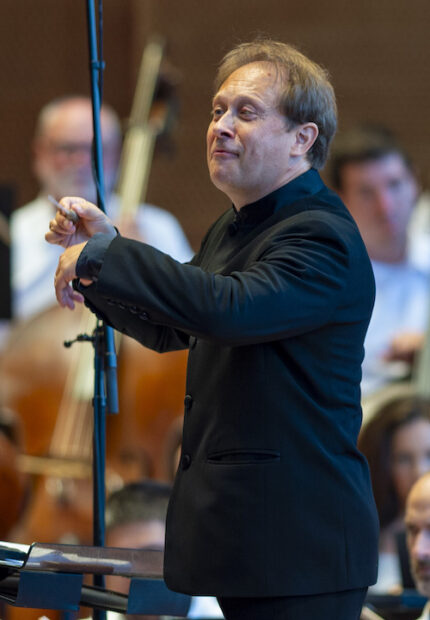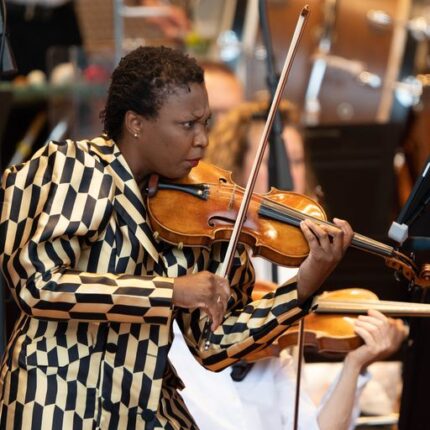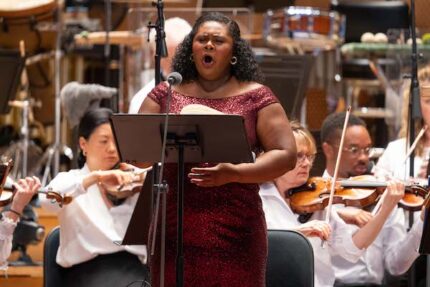Worlds collide engagingly with choral works and an American concerto at Grant Park Music Festival

For the past week the story of Chicago’s lakefront has been one of indiscriminate rainfall—gobs and gobs of it—and the resulting washouts of an historic street race and the annual American Salute concert under the Gehry bandshell.
Colorless skies threatened it all again Friday night at the Pritzker Pavilion but the Grant Park Music Festival resumed to full strength with a powerful choral showcase and a 21st century curiosity.
While the music of jazz great Wynton Marsalis is not the curiosity to classical audiences it once was, his Violin Concerto in D—co-commissioned by Ravinia and given its American premiere there in 2016—is still an eclectic adventure in an unfamiliar frontier.
If there is a trademark, unmistakably American Marsalis “sound,” there is also interest in how he synergizes that element within an established classical form associated with Beethoven, Sibelius and Vivaldi.
The music’s immediate appeal is felt through Marsalis’s whirlwind use of genre source material—blues, gospel, burlesque, ragtime, fiddle music from the British Isles. Marsalis incorporates several evocative passages of the remote Scottish highlands—the concerto was written for Scottish violinist Nicola Benedetti, who has recorded it—and in many ways the work is a cultural handshake between the new and old world.
Tai Murray was the violin soloist Friday night and the Chicago native made a passionate case for Marsalis’s vast four-movement work. Her strong musicianship was never in doubt, even with a tentative opening to the sleepy stardust “Rhapsody.” Once the music swelled into more nightmarish territory, she flourished with a display of bravura playing that sounded nearly improvisatory. When the musical narrative collapsed again into “ancestral memory,” as Marsalis describes it, Murray took full ownership of the score’s demanding upper-register lyricism.

In the outdoor setting Murray’s unaccompanied violin might not have been consistently full-bodied, but was always expressive. This worked well in the musical onomatopoeia of the “Rondo burlesque,” which contained street traffic chaos, train whistles, and animal calls—a full bayou bacchanal.
The concerto’s emotional high note is the “Blues” third movement, which showcases Marsalis’s gift for slowed-down, unsentimental melody. Here the disparate musical vernaculars coalesced and took shape, pointing the way to something larger. When the feet-stomping finale “Hootenany” marched to its plaintive cry and fade-out, the work had seemingly exhausted its many-layered personalities.
At a substantial 44 minutes, a truly satisfying long-arc narrative remains elusive in Marsalis’s concerto. This may not become a repertoire work, but should have its place on American-focused programs for many years to come.
Under the direction of conductor Ludovic Morlot, the Grant Park orchestra accompanied Murray at a respectful distance, but supplied powerful brass fanfares for a New Orleans-style procession, or hopeful string work, ala a Bernstein-esque ballad when needed.
The evening’s headliner might have been the concerto, but the second half’s tastefully spaced series of choral works bridging three centuries was the crowd pleaser.
In Mozart’s gorgeous Ave verum corpus, the three-and-a-half minute devotional motet carries with it the life of resigned contemplation, for the composer died just six months after its completion. The Grant Park Chorus animated the ascetic choral writing with perfectly voiced projection that rose consolingly above the competing urban backdrop.
From there the vocal soundscape diversified with Gabriel Faure’s precocious Cantique de Jean Racine, a composition he wrote at age 19 while still at the conservatory. This lyrical gem has a timeless quality that is suitable to myriad combinations of instrumental arrangements, but it was difficult to imagine a better marriage than the aggregate efforts of the Grant Park artistic forces on Friday.

The evening closed with Poulenc’s Gloria, a choral masterwork of bold contradictions. Here sacred profundity sits alongside hooligan mischief and secular playfulness. Soprano soloist and New Orleans native Lindsey Reynolds tied together this “problem work,” as Poulenc called it, with convincing aplomb.
Before the beginning of the second movement, “Laudamus Te,” Morlot cheerfully waited for a rogue siren to pass before allowing Reynolds’ entrance, and such patience was rewarded with a gripping, deeply expressive rendering of this engaging and unpredictable score. Throughout all her expressive vocal conviction was the bedrock support of a world-class chorus, leaving the audience pleading for more. This will certainly not be Ms. Reynolds’ last solo performance on a major stage.
This program will be repeated 7:30 p.m. Saturday at the Pritzker Pavilion. grantparkmusicfestival.com
Bryant Manning is the former classical music critic of Time Out Chicago. He has written for Chicago Classical Review, the Chicago Sun-Times, Entertainment Weekly, and the American Record Guide. He is a 2007 NEA Fellow from Columbia University in New York. He now works in higher education supporting programs in the arts and humanities.
Posted in Uncategorized


Posted Jul 09, 2023 at 11:31 am by Tim
“The sirens are telling of the Glory of God!” (I almost, and perhaps should have, playfully shouted from my seat during the extended pause.) The payoff of hearing that moving section sans sirens amplified its musical and the text’s significance.